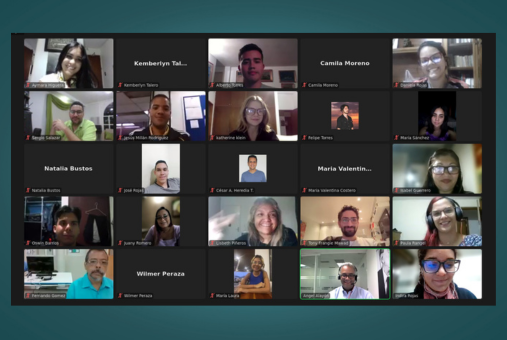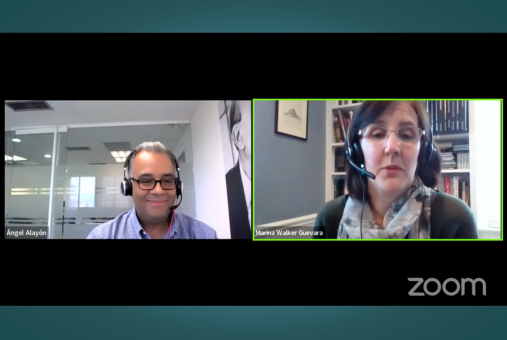In another attempt to undermine journalism, in early 2023, the Venezuelan government promoted a three-month online course to "train and certify reporters." It was a free program offered by the National Institute of Socialist Educational Training (INCES, by its Spanish acronym), under the auspices of the Ministry of Popular Power for Education of the Government of Nicolás Maduro.
Venezuelan journalists strongly rejected the initiative and described it as a strategy to "de-professionalize" journalism in the country, where that profession is learned and practiced in increasingly precarious conditions. In some states, social communication university schools have recorded high levels of desertion.
Based on various reports by organizations such as Espacio Público, the National Press Union (SNTP) and the Press and Society Institute (IPYS) on the situation of journalism in Venezuela, the investigative journalism organization Prodavinci saw the need to seek ways to strengthen the training of journalists in that country. Therefore, this year the organization decided to make use of its educational division, Academia Prodavinci, to contribute to the professionalization of Venezuelan communicators.
"In 2023, we started working with journalists and we saw a need considering the media crisis in Venezuela, the news desert and also a lack of formal and non-formal training for communicators," journalist Mariengracia Chirinos, head of Academia Prodavinci, told LatAm Journalism Review (LJR). "We saw a need and that perhaps our news outlet has the potential to contribute much more to the problem of freedom of expression that the Venezuelan environment is experiencing, to be able to offer a training program for journalists."

The first course of the Training Program for Journalists was Journalism and Economics, offered online at the end of March 2023. (Photo: Courtesy Prodavinci)
Academia Prodavinci hinges on educommunication, a concept that Prodavinci adopted in 2020 in an attempt to amplify the social impact of its journalism and contribute to education in Venezuela. Theories surrounding educommunication discuss how to build bridges between communication and education, and how the former can generate educational inputs that are useful for different areas of society.
The Prodavinci Academy's Training Program for Journalists officially began on March 9 of this year with the videoconference "Stories that change the world," given by the executive editor of the Pulitzer Center, Marina Walker Guevara.
The Pulitzer Center has been a crucial organization in the history of Prodavinci. Not only because it has provided support in projects that have received international recognition — such as its coverage of COVID-19, the investigation of data on forest fires and the multimedia report on the collapse of the Venezuelan pension system — but also because the Pulitzer Center’s communication and education program served as inspiration for the application of the concept of educommunication and the creation of Academia Prodavinci.
"They [The Pulitzer Center] not only focus on journalism, but they have a very strong educational vein that inspired us to say 'hey, this is a very successful experience that has a great public impact and that we can probably replicate on another scale —on a local scale— and that can be of great help to different areas,’" Chirinos said.
One of the hallmarks of Prodavinci's journalistic investigations has been the outreach to specialists from different disciplines. The editorial staff usually teams up with academics and scientists in collaborations that go beyond relationships with traditional specialized sources.
This collaboration is also present in Academia Prodavinci. The courses and materials developed by the initiative are led by specialists who are immersed in the topics they seek to address.
The first course of the Training Program for Journalists was Journalism and economics: A toolbox, and was offered in four online sessions at the end of March 2023. It was taught by economists Anabella Abadi, Giorgio Cunto and Ángel Alayón, the latter is the founder of Prodavinci. For the second course, on Journalism and health, held in May, a biologist and medical immunologists and infectologists were invited to serve as instructors.
"Academia Prodavinci's programs aim to strengthen the competencies and analytical skills of journalists. Their main objective is to train professionals capable of understanding and navigating the complex conceptual frameworks needed to effectively address contemporary problems and challenges facing Venezuela," Alayón told LJR. “Merely interviewing a specialized source or quoting from a book is no longer enough. The depth and breadth of the journalist's understanding of the issues he or she is addressing is essential. We want to see more and more journalism that is not only informative, but also contextualized, analytical and relevant to the audience.”
The courses for journalists consist of three sessions, plus a hands-on session focused on analyzing real cases of journalistic coverage on the subject of the course that were not the most successful.
"No coverage is perfect and that must be recognized. [The Prodavinci Academy courses] are not only focused on analyzing good practices, but also on looking with respect at what we should not do, but has been seen in the press," Joshua De Freitas, a journalism student who has taken two of the courses of the initiative, told LJR.

Marina Walker, executive editor of the Pulitzer Center, gave a videoconference presented by Ángel Alayón, founder of Prodavinci, to inaugurate the Journalist Training Program (Photo: Courtesy Prodavinci).
The next scheduled course is Journalism and women's economic empowerment: Tools for analysis and coverage, which will run from June 6. For the rest of 2023, the Training Program for Journalists plans to offer courses on topics ranging from human rights to climate change, Chirinos said.
Prodavinci selects and grants scholarships to about 40 applicants, mainly journalists and communication students, to take its courses free of charge.
"The Prodavinci Academy stands out for creating a bridge between world-class experts and young journalists. This model of symbiotic interaction facilitates a direct exchange of knowledge and experience," Alayón said. "Young journalists have the unique opportunity to learn directly from recognized experts, while experts have the opportunity to pass on their knowledge and understand the outlook of emerging journalists."
Academia Prodavinci's first efforts after its founding in 2020 focused on supporting the educational process of high school and university students, when facing challenges posed by remote education imposed by the COVID-19 pandemic in Venezuela.
Initially, the program focused on supporting the understanding of everything related to the pandemic. Prodavinci journalists realized that the COVID-19 coverage they had developed with the help of scientists and specialists had the potential to become educational material.
This is how the first explanatory guide was created, which gave birth to Aula Prodavinci [Prodavinci classroom], the Academia Prodavinci platform that combines explanatory journalism with pedagogical material to support student learning and the continuing education of teachers in Venezuela.
"We saw that probably if we developed this line of work, the Prodavinci Classroom, we were probably going to contribute content that neither students nor teachers could access at the time. And that probably if we, who had already worked hand in hand with specialists, could turn that content into guides, it was going to be much easier to explain the pandemic," Chirinos said.
The Prodavinci team realized that other journalistic investigations they had published also had explanatory and pedagogical potential, and that they could be turned into guides to explain other topics. Thus, other guides on health issues emerged, such as "Malaria times in Venezuela," "How water is purified" and "Breast cancer in Venezuela", among others.
In 2022, Aula Prodavinci ventured into historical topics, with guides on the history of democracy and the education system in Venezuela.
"Our main intention is to put this at the service of society. It’s our main objective: how can our work go beyond publication and have greater utility in different arenas, when dealing with stories that are evergreen or explain phenomena that repeat over time," Chirinos said.
Academia Prodavinci involves most of the editorial staff, which is made up of 12 people. When a Prodavinci journalist is developing a feature story that could be turned into a guide to explain a topic, he or she starts working in collaboration with Jesús Piñero, a journalist of the organization who is also a historian and educator.
"In that way we team up a journalist who has investigated, who has reported, who has developed a project together with a person who has those instructional or pedagogical skills to be able to come up with a language, a narrative and formats that are in line with educational training, at different levels," Chirinos said.

Academia Prodavinci's explanatory guides are based on investigative reports developed by the organization's journalists. (Photo: Courtesy of Prodavinci)
The journalists behind Academia Prodavinci also see the initiative as a way to contribute to the fight against disinformation and censorship in Venezuela. According to Chirinos, this is achieved not only by preparing journalists to develop work with sufficient quality to shield them from government attempts to discredit journalism, but also by educating audiences and winning back their trust, which has been lost in the face of the crisis facing journalism in Venezuela.
"Freedom of expression organizations and specialists have said that part of the solution to the media crisis — that not only Venezuela but also Latin America and much of the world is experiencing — could be solved through education," Chirinos said. “For these risks of disinformation and the circulation of information that contaminate public discourse, one of the great solutions is not only to do more and better journalism, but also to educate audiences and that these audiences — citizens — have better criteria, not only to consume journalistic content, but also to know what to expect from journalism.”
Alayón, for his part, gave a positive assessment of the first months of the Journalist Training Program and said that the efforts are already beginning to have a tangible impact via the journalistic work developed by the first cohort of students.
"Participants in our courses are not only acquiring new knowledge and skills, but are also applying them effectively in their work. This demonstrates the effectiveness of our hands-on learning approach based on analytical frameworks and case studies," Alayón said.